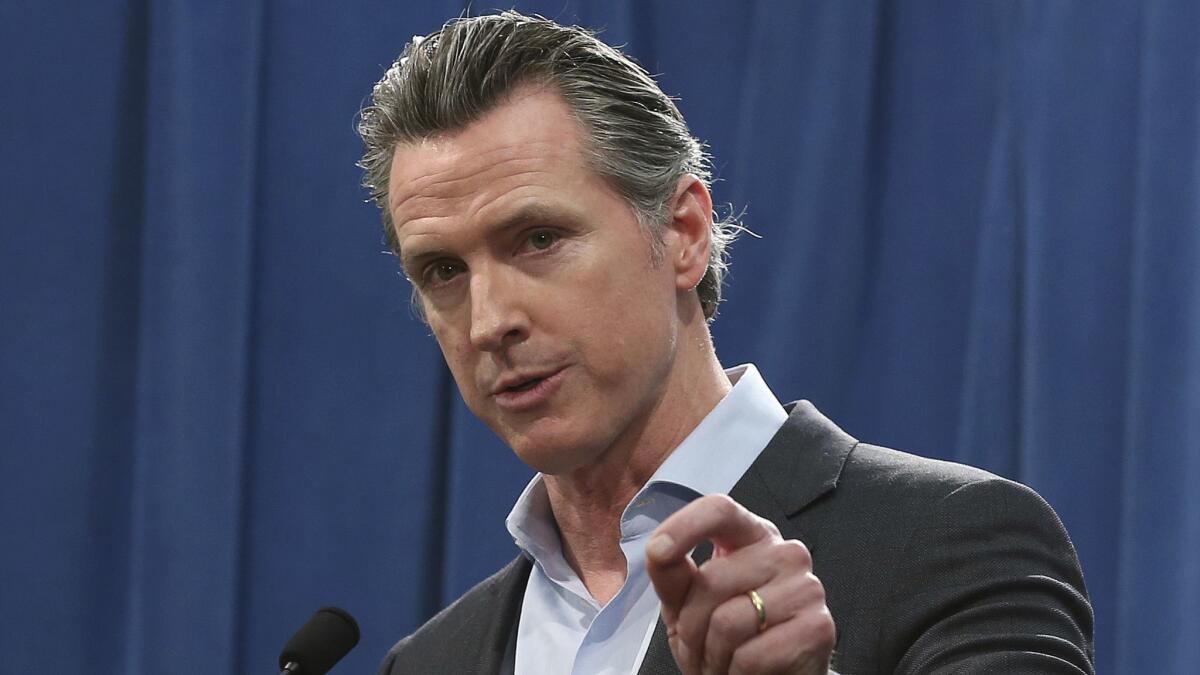Column: Trump slashed consumer protections. So California is stepping up

After years of the Trump administration steadily rolling back federal consumer financial protections, California has decided enough is enough.
Gov. Gavin Newsom will unveil a California Consumer Financial Protection Law as part of his proposed 2020-21 state budget, to be introduced Friday.
“As the Trump administration undermines and weakens the rules that protect consumers from predatory businesses, California is filling the void and stepping up to protect families and consumers,” he told me via email.
Details at this point are scant. But it appears what California is trying to do is create a state version of the Consumer Financial Protection Bureau. That’s the federal agency created by the Dodd-Frank Wall Street Reform and Consumer Protection Act signed into law by President Obama in 2010.
Since President Trump took office, he has chipped away at the bureau’s oversight of financial firms, making the CFPB, to a great extent, a consumer-protection watchdog in name only.
According to materials shared with me by the governor’s office, the proposed California Consumer Financial Protection Law would overhaul the existing Department of Business Oversight and rename it the Department of Financial Protection and Innovation, or DFPI.
The Department of Business Oversight is already active in consumer protection. According to its website, the agency “oversees the operations of state-licensed financial institutions, including banks, credit unions, money transmitters, issuers of payment instruments and travelers checks, and premium finance companies.”
Premium finance companies, in case you were wondering, are firms that lend money to individuals and businesses to cover insurance premiums. Yes, that’s a thing.
The Department of Business Oversight currently licenses and regulates securities brokers and dealers, investment advisors and payday lenders.
As the rejiggered Department of Financial Protection and Innovation, the state agency would continue doing all that plus take on additional regulatory power and responsibility.
The governor’s office told me this would include “dozens of new staff,” greater scrutiny of consumer markets “to identify patterns of abuse,” and increased outreach to people frequently targeted for questionable financial practices, such as veterans and immigrants.
Significantly, the new law also would give the state oversight of debt collectors — a regulatory function now limited to federal authorities.
I asked the governor’s office if it’s expecting debt collectors to sue California on grounds that federal law preempts state law and that California thus has no right to stick its nose into the industry’s business.
The answer I received is no, a lawsuit is unlikely.
I think litigation is all but certain, although the federal law does say states can enact regulations for debt collectors that are “not inconsistent” with what’s already on the books.
The governor’s office expects the expanded watchdog agency to cost state taxpayers $44.3 million over the first three years, to be paid for by existing cash in the budget of Department of Business Oversight. No new funding would be required at the outset.
It goes without saying that some people — particularly conservatives — will view any expansion of state government as an inherently bad idea. Such folk never hesitate to point at the pitifully dysfunctional Department of Motor Vehicles and use that as the poster child for bureaucratic incompetence.
The reality is there’s a long history of states stepping up when federal authorities shirk their responsibility. The legalizing of marijuana is one such example.
California is already a national leader in consumer protection, with some of the country’s toughest environmental and privacy rules. It’s no stretch to see us playing a more active role in financial regulation.
And it’s not as if the Trump administration wants such responsibility.
Under Trump’s watch, the Consumer Financial Protection Bureau has scaled back numerous safeguards aimed at defending people from abusive business practices.
Among the more noteworthy changes is doing away with a requirement that payday and car-title lenders ensure that borrowers can pay back their obligations in a reasonable amount of time and don’t become mired in debt.
That common-sense rule was set to take effect in August. The Trump administration postponed its implementation by 15 months and said it hoped to get rid of it entirely.
Requiring short-term lenders to perform due diligence on borrowers “would impose substantial burdens on industry,” the CFPB announced last year.
That, of course, is nonsense.
“Requiring affordable loans that a borrower can pay back without taking out another loan would have protected millions of people who are typically caught by lenders in high-cost debt traps,” said Christine Hines, legislative director for the National Assn. of Consumer Advocates.
Fun fact: The payday lending industry for the first time held its annual convention at the Trump National Doral Miami resort in 2018. Payday lenders returned to the Trump-owned hotel for last year’s event as well.
Kathleen Kraninger, the former White House official appointed by Trump to run the CFPB, said in a speech last year that consumers need “to help themselves, protect their own interests.”
As such, she said the bureau would focus more on educational efforts as opposed to cracking down on financial firms.
A report last year from the Consumer Federation of America found that the CFPB’s enforcement activity had plunged by 80% from 2015, when the agency was at the height of its powers. Average compensation to aggrieved consumers was down by a whopping 96% per case.
A single state, even one as influential as California, can’t remedy that all by itself. And it remains to be seen whether Newsom’s proposals represent meaningful change for consumers.
But it’s clear that federal authorities are less interested now than they once were in having our backs when dealing with the bad apples of the financial world.
If California can help fix that, it’s a step in the right direction.
Color me cautiously optimistic about what the governor is cooking up.







